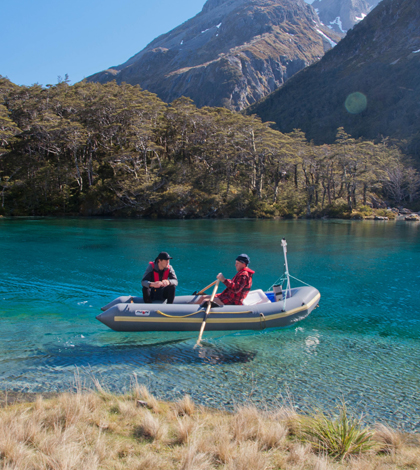Remote New Zealand lake found to be among the world’s clearest

Chris Appleby and Rob Merrilees in the NIWA research vessel in transit to a Blue Lake sampling station (Credit: Mark Gall)
For decades, scientists have been fascinated by the color and clarity of water. Very high water clarity is extremely rare in nature. So it is was with some surprise that a team of scientists from the National Institute of Water and the Atmosphere in New Zealand recently discovered that Blue Lake, in Nelson Lakes National Park on the country’s South Island, is the visually clearest freshwater lake ever reported.
Mark Gall, a scientist at NIWA, said colleague Rob Merrilees had seen Blue Lake and thought it could be comparable to Pupu Springs, another South Island lake that was the clearest reported freshwater at the time.
“Beginning in 2009, we conducted an investigation working with optical instrumentation and techniques developed for the ocean and found that Blue Lake was actually visually clearer than Pupu Springs and clearer than we could have imagined,” said Gall, lead author of a recent paper on Blue Lake.
Water clarity can be assessed a variety of ways, including measuring the maximum distance that a black disk can be viewed horizontally underwater. This method “is a good index of visual ranges of practical importance for humans and aquatic animals,” says study coauthor and NIWA scientist Rob Davies-Colley. The theoretical maximum for this method is about 83 meters (272 feet) in pure water. Blue Lake visibility, by comparison, ranged from 70-80 meters (230-262 feet). Even photos from days when the water is less clear (around 65 meters or 213 feet) reveal remarkable blue violet colors and outstanding clarity.

Blue Lake seen from a nearby slope. Intensive sampling and measurements found the lake to be among the world’s clearest. (Credit: Mark Gall)
Because the lake is shallow, other methods like the Secchi disk that are common elsewhere can’t be used. Gall and his colleagues visited the site several times by helicopter to collect water samples and measure water clarity with an underwater transmissometer from Martek Instruments. The crew also installed another transmissometer and instruments to measure temperature and depth at the bottom of the lake that recorded measurements sub-hourly intervals. A Zebra Tech brush wiper helped minimize biofouling on the sensors. Since the lake is difficult to access, the equipment included cellular telemetry for remote daily data access. Gall and his colleagues also gauged spring inflows with an Ott current meter.
The research team found that highly turbid water occasionally flushes into the lake from water and particles upstream, rapidly reducing the water clarity. However, these turbid episodes are short lived and high clarity is restored within a few days as clear spring-flow flushes the injected particles.

Instrument monitoring package, including a transmissometer, ready for deployment in Blue Lake. (Credit: Mark Gall)
High clarity is a rare feature in lakes due to landscape inputs of organic carbon, nutrients, and particles. Because of this, clarity is often a useful indicator of water quality, and clarity usually drops when human impacts increase.
Fortunately, “the remoteness of Blue Lake, the difficulty of access, and its location in a national park all contribute to the protection of this system,” said Davies-Colley. “But climate change remains a threat.”
Top image: Chris Appleby and Rob Merrilees in the NIWA research vessel in transit to a Blue Lake sampling station (Credit: Mark Gall)











Pingback: Friday Five: Clearest Lakes Around the World - Lake Scientist